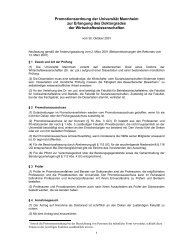The returns to cognitive and non-cognitive abilities in Germany
The returns to cognitive and non-cognitive abilities in Germany
The returns to cognitive and non-cognitive abilities in Germany
Create successful ePaper yourself
Turn your PDF publications into a flip-book with our unique Google optimized e-Paper software.
also employ the FFM taxonomy of personality are by Nyhus <strong>and</strong> Pons (2005) <strong>and</strong> by<br />
Mueller <strong>and</strong> Plug (2006), the latter be<strong>in</strong>g of further relevance, s<strong>in</strong>ce it is one of the few<br />
analyses that exam<strong>in</strong>e both <strong>cognitive</strong> <strong>and</strong> <strong>non</strong>-<strong>cognitive</strong> <strong>abilities</strong>. Nyhus <strong>and</strong> Pons use data<br />
from the Dutch DNB Household Survey (DHS). <strong>The</strong>ir f<strong>in</strong>d<strong>in</strong>gs suggest that emotional<br />
stability, i.e. <strong>in</strong>verse neuroticism, is positively associated with wages of both males <strong>and</strong><br />
females but that agreeableness is negatively related <strong>to</strong> females’ wages. Furthermore, men<br />
benefit from conscientiousness at the beg<strong>in</strong>n<strong>in</strong>g of an employment relationship but from<br />
au<strong>to</strong>nomy as tenure <strong>in</strong>creases.<br />
As for <strong>Germany</strong>, there is only scarce evidence on the relationship between<br />
<strong>in</strong>dividuals’ personality <strong>and</strong> earn<strong>in</strong>gs: Us<strong>in</strong>g the SOEP, Flossmann et al. (2007) exam<strong>in</strong>e the<br />
role of personality traits for labor market success by focus<strong>in</strong>g on the LOC measures. <strong>The</strong>y<br />
f<strong>in</strong>d that personality matters even when controll<strong>in</strong>g for different aspects such as education<br />
<strong>and</strong> professional experience. <strong>The</strong>y conclude that labor market success is <strong>in</strong>fluenced by early<br />
childhood s<strong>in</strong>ce the formation of personality occurs dur<strong>in</strong>g the first years of life under the<br />
<strong>in</strong>fluence of the parents <strong>and</strong> the educational system. Dohmen et al. (2009) also use SOEP<br />
data <strong>in</strong> their cross-sectional study <strong>to</strong> <strong>in</strong>vestigate the relevance of personality for labor market<br />
outcomes <strong>and</strong> overall life success <strong>in</strong> <strong>Germany</strong>. <strong>The</strong>y focus on measures of reciprocity <strong>and</strong><br />
show that positive reciprocity is rewarded with higher wages, whereas negative reciprocity<br />
<strong>in</strong>creases the probability of unemployment. However, the exist<strong>in</strong>g studies for <strong>Germany</strong><br />
neither <strong>in</strong>clude additional personality <strong>in</strong>dica<strong>to</strong>rs, which are presumably associated with<br />
reciprocity, e.g. the FFM traits, nor measures of <strong>cognitive</strong> <strong>abilities</strong>. It therefore rema<strong>in</strong>s an<br />
open question whether locus of control or reciprocity affect earn<strong>in</strong>gs when other personality<br />
traits <strong>and</strong> <strong>cognitive</strong> skills are taken <strong>in</strong><strong>to</strong> account.<br />
Evidence on the jo<strong>in</strong>t relationship between <strong>cognitive</strong> <strong>abilities</strong>, personality <strong>and</strong> labor<br />
market outcomes at the same time is only provided by a few studies on the US <strong>and</strong> the UK.<br />
9















